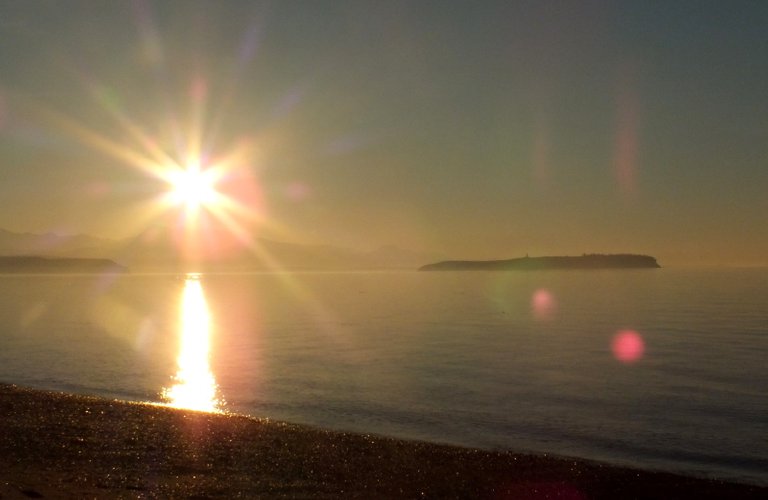The world is coming to an end! There's an evil government wanting to mind control us all, and they'll force us to be vaccinated against non-existent viruses so they can monitor our every move through nanotechnology and arbitrarily kill us, using 5G techology given to "them" by the aliens who have been working with the Shadow Government to take over planet Earth since one of their ships crashed in Roswell, New Mexico in 1947!
No, it's not! The world is just fine, and humanity is slowly awakening to a higher level of consciousness through which we will see through undesired and destructive patterns and create a world of peaceful and prosperous cooperation between all nations and all peoples!
The Government is out to GET us!
The Government is out to HELP us!

Hard to Know What the TRUTH is...
One of the often overlooked "pink elephants in the room" is the reality that however you felt about reading either of the above scenarios probably says more about your mindstate than it does about the reality of what's really going on out there.
To put it in very simple terms, a depressed alcoholic with a drug addiction is going to perceive a very different reality than a healthy and well-balanced individual, even when looking at the exact same thing.
As such, when we subscribe to either utopian or dystopian views of the world and our future, we are NOT unbiased bystanders merely examining concrete reality... we are viewing the information coming at us through our individual lenses of perception, created in part by our own bodies of experience, and in part by our mental/emotional states of the moment.
For example, I carry with me the childhood "lifelesson" that my parents were unreliable and lied a lot; as an adult I have a hard time trusting any information I can't personally verify first hand... regardless of whether I have a personal bias towards wanting it to be true or false.

The REAL "Lord of the Flies"
One of the stories that came across my newsfeed in the last few days was that of a real group of six teenage boys who were marooned on a tiny rocky island near Tonga for 15 months, in the mid 1960's.
You might wonder why this is news now; the answer is a Dutch reporter went in search of evidence (or not) that Nobel Prize winner William Golding's classic 1954 novel "Lord of the Flies" might not really be how humans would behave, if taken outside our civilized world.
I had to read "Lord of the Flies" when I was in school; many people did... 25 million copies have been sold.
When I was 14 and read the book, I found it utterly unrelatable. When I read it again in my late 30's — as part of an attempt to "read up on the classics" — I found it completely unrelatable, again

As reality would have it, those actual marooned boys did not descend into a state of feudal chaos like the boys of Golding's book, they peacefully worked together to survive. By no means did they live a perfect life as castaways, but they also didn't live Golding's "version."
My point? Lenses of perception.
Pretty much any biography you read of author William Golding will tell you that he was an angry and frustrated youth who bullied those around him, and even openly confessed first hand that he "enjoyed hurting people." Lord of the Flies is a dystopia filtered through his lens of perception and body of experience.

Look Inward, Young Man!
Although it is definitely not something I am proud to admit, I have long believed that in these utopian and dystopian scenarios, it's difficult to go wrong by putting your faith in the general apathy of the silent majority.
People often come to me with their (both) dystopian and utopian visions of the world, and what typically comes to mind (for me) is something along the lines of "that's all good and fine, but I think you'll find that MOST people simply don't give a shit, either way."
But I also recognize that this is a response rooted in my own tendency to rarely get fired up about ANYthing. I often see things — events, ideas, inventions, etc. — being excitedly touted as "the next great thing" and I just can't find it in myself to muster even a tiny thread of enthusiasm.
And so, I am AWARE that when someone brings me their "Evil Illuminati" story or their "Human Ascension" story, I must stay awake and aware that my own filters could be throwing a fog over the actual facts.

A Grain of Salt, AKA "Cynicism"
I suppose my cynicism inevitably leads me to a place where it feels like the vast majority of the world pretty much just want to "be left alone to do their thing."
Which — at least to me — explains why most "causes" just end up fizzling, because very few people share the passion and enthusiasm of any given cause's originators.
If you look at the history of the world, we might remember the great leaps of change; the great events (because they tend to be recorded and written about), but most events and changes tend to have tiny and incremental effects.
Hence, the entire notion of "changing the world" isn't something you can just wake up and do, one day... it tends to take generations.
And maybe that's where we have to realize that we don't get to "change the world," we just get to plant a few seeds for potential change, down the road.
Thanks for reading!
How about YOU? To what degree do you believe our perceptions of "reality are shaped are shaped by our upbringings and personal histories? Can we truly be "objective" about what's happening in the world? Leave me a comment! Because — after all — SOCIAL content is about interacting, right? Leave a comment — share your experiences — be part of the conversation!*
Greetings bloggers and social content creators! This article was created via PeakD, an application that's part of the Hive Social Content Experience. If you're a blogger, writer, poet, artist, vlogger, musician or other creative content wizard, come join us! Hive is a little "different" because it's not run by a "company;" it operates via the consensus of its users and your content can't be banned, taken down or demonetized. And that counts for something, these days! So if you're ready for the next generation of social content where YOU retain ownership and control, come by and learn about Hive and make an account!


(As usual, all text and images by the author, unless otherwise credited. This is original content, created expressly and uniquely for this platform — NOT cross posted anywhere else!)
Created at 20200804 10:00 PDT
0092/1320
Very insightful post. Thanks for the food for thought. I also heard of that actual LofF incident being far more life affirming than the fictive one. I didn't know that about Golding, but makes sense. In general, I'm sick of even history being written by some of the most toxic individuals. It's important to always note the perspective of the writer.
You spoke a sad truth there @indigoocean!
I don't know if it's simply the result of the squeaky wheel theory, but so many pieces of our history does seem to come back to lay at the feet of some very toxic people. And because humans tend to be short sighted, more time is spent in the analysis THAT something happened, as opposed to exploring HOW something happened.
Thanks for the support @ackhoo, I appreciate it!
Here's that social media #posh thing:
twitter:
Hi there @cuddlekitten, thanks for visiting — cute as always!